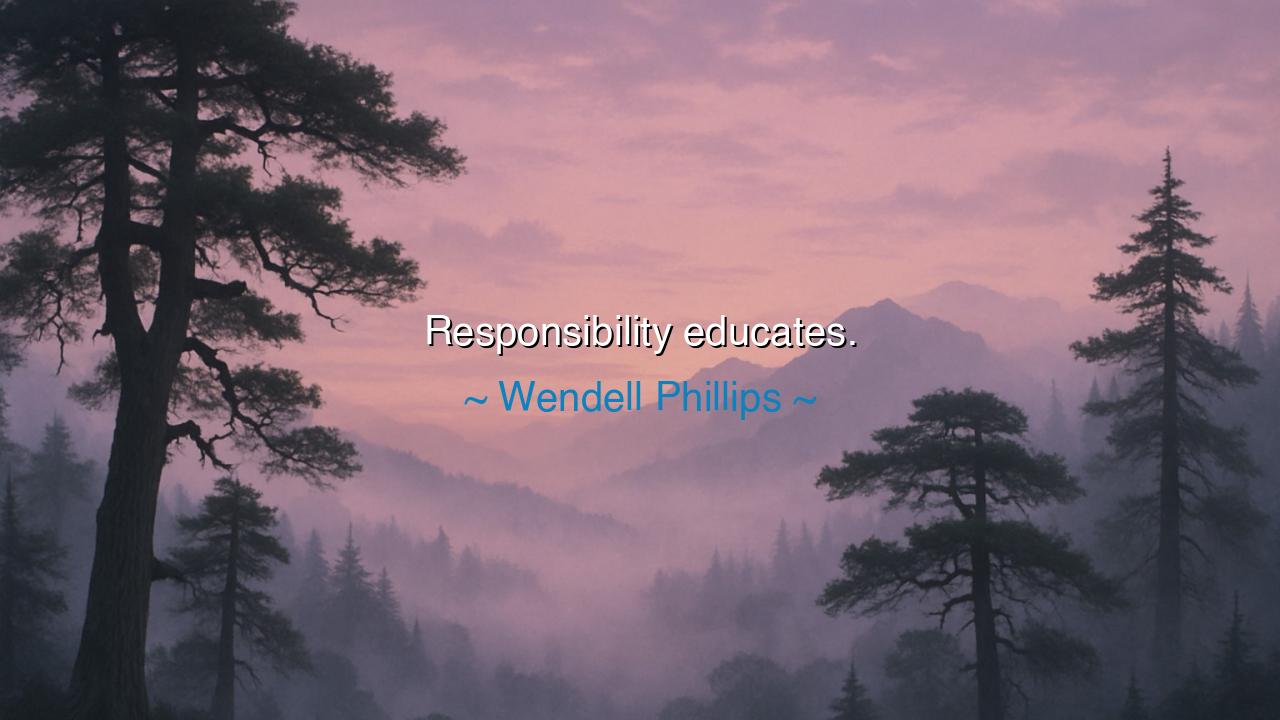
Responsibility educates.






"Responsibility educates." With these three words, Wendell Phillips, the great American abolitionist and orator of the nineteenth century, spoke a truth that stands as tall as the pillars of civilization. Simple in phrasing yet profound in depth, his statement reveals that the truest form of education does not come solely from books or teachers, but from the burden of duty, the weight of consequence, and the act of doing what must be done. To Phillips, responsibility was not merely an obligation—it was a school for the soul, a divine instructor that shapes character, deepens understanding, and forges wisdom through the fire of experience.
Phillips himself lived these words. A man of privilege and learning, he could have lived comfortably in silence, yet when he heard William Lloyd Garrison denounce slavery, his heart was struck by the call of moral duty. He took up the cause of abolition, sacrificing reputation, wealth, and peace to stand for what was right. Through the trials of this struggle, through threats and ridicule, he discovered what no classroom could teach: that responsibility transforms the mind and purifies the spirit. By shouldering the burden of justice, he was educated by action, not by theory. Thus his quote was not mere reflection—it was born from a life that proved its truth.
To say that responsibility educates is to say that life itself is the greatest teacher. When one is entrusted with duty—whether to a family, a craft, a community, or a principle—one begins to see the world not as a spectator but as a participant. The lazy and the careless remain children in the eyes of wisdom, no matter their age or schooling, for they have never borne the weight of consequence. But the man or woman who accepts responsibility—who stands when others flee, who takes ownership of their words, their choices, their failures—learns lessons that no lecture can impart. They gain strength through trial, patience through difficulty, and humility through error. They come to understand that wisdom is not granted but earned, often at great cost.
History offers countless examples of this truth. Consider Abraham Lincoln, who began life in poverty, taught himself by the dim light of a candle, and grew through the weight of responsibility placed upon him. It was not his education in law or politics that made him great—it was the burden of the Union, the responsibility of leading a nation through its darkest hour, that matured his judgment and tempered his heart. Responsibility was his teacher, sorrow his tutor, and perseverance his graduation. When he signed the Emancipation Proclamation, it was the act not merely of a president, but of a man fully educated by duty, pain, and resolve.
The ancients understood this long before Phillips gave it voice. In every civilization, the elders taught that knowledge without responsibility is empty, like a sword without a warrior. Marcus Aurelius, emperor and philosopher, learned through the trials of leadership that the soul is disciplined by duty; that every decision carries the weight of others’ lives. Likewise, the heroes of myth—Odysseus, Arjuna, Gilgamesh—did not gain wisdom in comfort, but through the struggles their responsibilities demanded. In this way, responsibility is not only a moral teacher but a spiritual one—it awakens self-knowledge, for in bearing the weight of duty, one discovers one’s own strength.
Phillips’ quote also carries a warning. A society that shelters its citizens from responsibility also shelters them from growth. When people are not held accountable, they become weak; when they are never entrusted, they remain ignorant. Responsibility, though heavy, dignifies the soul—it demands maturity, purpose, and care. To avoid it is to choose immaturity; to embrace it is to become wise. Thus, to educate a person truly, we must not merely fill their mind—we must give them something worth carrying, something that calls forth courage, diligence, and integrity.
Let this then be the lesson: do not flee from responsibility, for it is the path to greatness. Accept the duties life places before you, whether large or small, and let them teach you. In your work, take ownership; in your relationships, be steadfast; in your principles, stand firm even when the cost is high. Each time you bear a responsibility, you add a new layer of wisdom to your soul. For as Wendell Phillips declared, responsibility educates—and it is through this education that the mind is sharpened, the heart is strengthened, and the spirit becomes worthy of the life it has been given.






AAdministratorAdministrator
Welcome, honored guests. Please leave a comment, we will respond soon